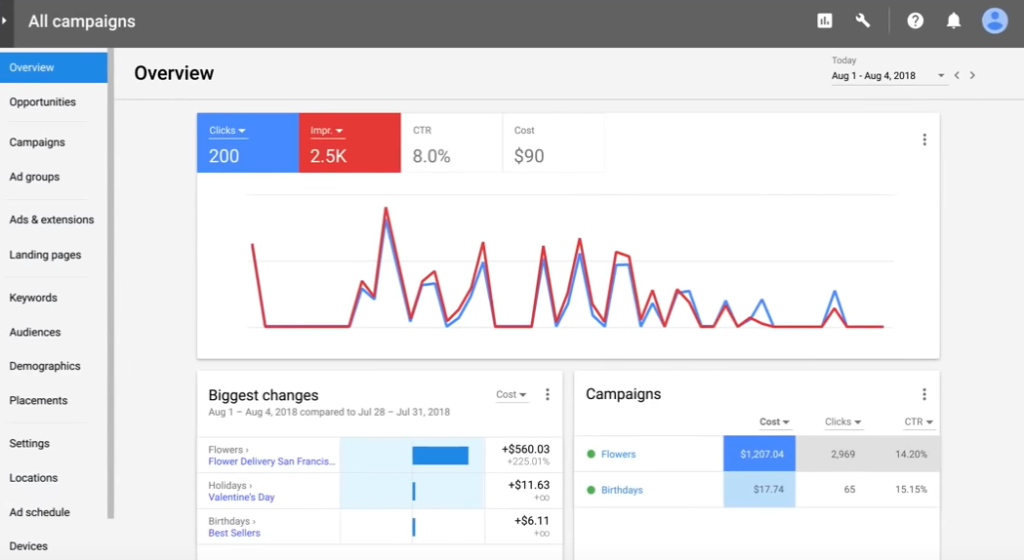How to Get the Most Out of Your Google Ads Campaigns and Make Them Worth It!
Are Google Ads worth it? A very good question, and one most digital marketers/business owners have pondered. Honestly, it depends on who you ask. Many will say no and that they’ve wasted thousands of dollars on Google Ads. Others will say that they owe all their success to the power of Google Ads. So, what’s the deal?
In Google’s 2018 Economic Impact Report, they’ve estimated that businesses make an average of $2 in revenue for every $1 they spend on Google Ads. That’s a pretty good ROI.
So, are Google Ads worth it? Yes, they can pay off. But they’ll only pay off if they’re done right. The better question might be, how can I make Google Ads worth it? Here are a few tips that’ll make Google Ads worth the spend.
Keep Your Keyword Targeting Tight
When you’re creating your first Google Ads campaign, it’s easy to just type in a few keywords related to your products and let it fly. Unfortunately, that’s the #1 way businesses lose money on Google Ads. In this case, an example is probably the easiest way to explain.
Let’s say your business is a pizza restaurant. Keywords like pizza near me, pizza delivery, pizza restaurant are great—they’re related to what you offer. Searches like restaurant, pizza recipes or Italian restaurant aren’t a great fit– while some of those people might be looking for what you offer, many will be looking for something else.
Secondly (and here’s where it gets complicated) you need to be aware of how Google matches search queries to the keywords you’re targeting. If you just type pizza in as your target keyword, Google will show your ad to any search related to pizza: pizza recipe, pizza photo, etc. That’s not what you want. You want to use Google’s keyword match types to only target searches that are highly relevant to what you’re selling.
Tip: When you’re getting started, use exact match type. It’s the most restrictive and will ensure you’re minimizing cost and only targeting highly relevant searches.
Work to Improve Your Quality Score
Your Google Ad Quality Score is a key component to your Google Ads success. Your quality score affects your ad rank and the price you pay on ads. The best way to think about it is better quality score = lower prices and better ad positioning for you. I’m sure your next question is, how do I improve my quality score? Well, Google defines the quality score formula as “an estimate of the quality of your ads, keywords, and landing pages.” Here are couple best practices to improve your quality score:
- Go for low hanging fruit with your keyword targeting – As Google said, the quality of your keywords matter. What they are referring to is the relevance of your keywords. Dig through your search queries report to see what search queries users are finding you with. Double down by setting up your keyword targeting to target high-performing queries to improve your quality score and results.
- Consistency with Your Content – As we mentioned, it’s vital to have quality (and relevant) ad copy and landing pages. We highly recommend ensuring that your ads, keywords and landing pages possess the same tone, keywords and messaging. For example, if you’re looking to drive sales for the keyword phrase “cheap beach towels.” Make sure your ad focuses on how you offer the best prices and your landing page heavily empathizes it as well. Doing this will give you the highest chance of obtaining a good quality score.
Use Google Ad Extensions
Google Ad extensions can help you stand out in the ever-competitive search engine results page (SERP). They are also known to improve your click-through rates, which Google has acknowledged. They are features that you can add to your Google Ads that will make them larger, more attention-grabbing and more user friendly. Extensions can include location information, additional links, call buttons and more to your ads.
According to Google, they select “which extensions to show in response to each individual search on Google. For that reason, it’s a good idea to use all the extensions relevant to your business goals.” So, this is a case of the more the merrier.
Here are few Google Ad Extensions that can get overlooked, but should be considered during your next campaign:
- App Extensions – If you have an app, make sure to cross promote it with your Google Ads.
- Review Extensions – Testimonials on your page can be overlooked and places like Yelp aren’t always the most reliable. Let your customers see positive reviews right in their SERPs.
- Offer Extensions – Take advantage of the additional text by coupling your discounts with your main ad copy.
Are Google Ads Worth It? They Are If You’re Tracking Correctly!
This may sound obvious but it’s an important one. You need to make sure you’re correctly tracking your conversions. It’s a fairly simple process to setup, which Google has laid out nicely. You can pretty much track any kind of call to action, such as phone call conversions, app conversions, offline conversions and more.
Once you’re tracking is setup, it’s time to make good use of it. This brings me to my next point…
Adjust Based Off Performance
With any marketing campaign, you should track and adjust based off your results. Google Ads is no different. Once your tracking is setup, you’ll find some great tracking tools directly in the platform. All you need to do is go to your Overview page and you’ll find several tracking tools there.

This includes a line chart that allows you to view multiple performance metrics in a single place within a custom date range. There are also cards below the line chart that pull interesting patterns from your analytics.
Then you can dive in and look at which specific keywords and search queries are driving conversions. For example, you should reduce the bids or completely shut down any keywords that aren’t converting.
You can also dig into your time and geographic analytics for insights. This will help you identify what times, locations and devices are converting for you and which are wasting your money. This information will allow you to adjust your targeting settings appropriately.
The goal is pretty simple when adjusting based on your tracking analytics – you want to be spending where you get the most results.
So, when you ask, “are Google Ads worth it?” The answer will always be based on how much time you’re willing to put into your execution and optimization.
Be Wary Of…
Couple items to be wary of. The Display Network can cause you to spend a lot of money with no results. Sometimes Google will automatically include display ads in your Google Ads campaigns. You want to make sure you check what sites your ads are running on and if they aren’t logical for your product, you’ll want to cut them from your campaign (if you’re not seeing conversions from display ads, just turn off the Display Network).
You should also be wary of Google’s automated bidding strategies. Sometimes they work, sometimes they spend way too much money. It’s best practice to set your own bids and not rely on Google’s suggestions.
Group Your Keywords Based on Relevance
When putting together a Google Ads campaign, a key component to success is properly grouping your keywords. Grouping keywords allows you to give Google a well-rounded perspective on what customers should be matched to your ads. When doing this you might be tempted to try and fit as many keywords as possible to cast a wider net. Bad idea!
As we said in the quality score section, Google looks at the quality of your keywords. And remember, with Google Ads, quality often means relevance. If you go all over the spectrum with your keyword group, Google may interpret this as a lack of relevance. Always match your landing page copy, ad copy and keyword group. You’ll want many variations of your keyword phrase but just make sure to keep the variations similar.
Stick with a theme, such as cheap beach towels, affordable beach towels, where to buy cheap beach towels, etc.
Another way to ensure your keyword groups are relevant is by using negative keywords. Negative keywords allow you to tell Google what keywords you don’t want related to your campaigns. An example of using a negative keyword would be if you had a gluten-free cupcake that wasn’t organic, and you used “organic” as a negative keyword to ensure you got the right kind of traffic.
Coordinate Your Google Ads Campaign with Your Overall Marketing Strategy
All too often I run across marketing departments that treat Google Ads campaigns (and organic SEO for that matter) as the black sheep in the marketing department. SEM and SEO marketers are sort of off in the corner churning out blogs and ad campaigns strictly based off keywords and no other input. This strategy can get some results, but we are here to maximize your results.
It’s important to coordinate your SEM and SEO efforts with the rest of your strategy. If you are running a broad marketing campaign where you have a commercial, radio ads, print ads, social media posts, etc. pushing your new eco-friendly beach towel that is going to save the planet, then make sure to push it with your SEO content and Google Ads as well. If people are seeing it, their searching for it.
You want to be easy to find. You never know what blog or ad campaign will show up in a SERP and if the user viewing that SERP somewhat paid attention to your commercial and puts two and two together, they may just give you a click.
So, what was the question again? Are Google Ads worth it? The answer is yes, but now it’s up to you to put the effort in and make it worth it.





